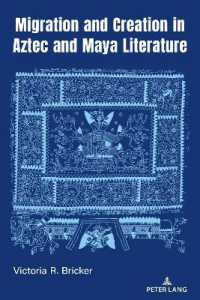Full Description
Asset-based pedagogies, such as culturally relevant/sustaining teaching, are frequently used to improve the educational experiences of students of color and to challenge the White curriculum that has historically informed school practices. Yet asset-based pedagogies have evaded important aspects of students' culture and identity: those related to disability. Sustaining Disabled Youth is the first book to accomplish this. It brings together a collection of work that situates disability as a key aspect of children and youth's cultural identity construction. It explores how disability intersects with other markers of difference to create unique cultural repertoires to be valued, sustained, and utilized for learning. Readers will hear from prominent and emerging scholars and activists in disability studies who engage with the following questions: Can disability be considered an identity and culture in the same ways that race and ethnicity are? How can disability be incorporated to develop and sustain asset-based pedagogies that attend to intersecting forms of marginalization? How can disability serve in inquiries on the use of asset-based pedagogies? Do all disability identities and embodiments merit sustaining? How can disability justice be incorporated into other efforts toward social justice?
Book Features:
● Provides critical insights to bring disability in conversation with asset-based pedagogies.
● Highlights contributions of both university scholars and community activists.
● Includes analytical and practical tools for researchers, classroom teachers, and school administrators.
● Offers important recommendations for teacher education programs.
Contents
ContentsSeries Foreword ix
Acknowledgments xiii
Disability and Asset Pedagogies: An Introduction to the Book xv
Kathleen A. King Thorius and Federico R. WaitollerPart I: CENTERING DISABILITY CULTURE AND IDENTITY IN SCHOOLS AND SOCIETY
1. Disabled Lives: Worthiness and Identity in an Ableist Society 3
Anjali J. Forber-Pratt and Bradley J. Minotti2. Cultivating Positive Racial-Ethnic-Disability Identity: Opportunities in Education for Culturally Sustaining Practices at the Intersection of Race and Disability 17
Seena M. Skelton3. Smooth and Striated Spaces: Autistic (Ill)legibility as a Deterritorializing Force 31
Sara M. Acevedo and Robin Rosigno4. Luring the Vygotskyan Imagination: Notes for a New Bridge Between Disability Studies in Education and Asset Pedagogies 46
Federico R. WaitollerPart II: SUSTAINING DISABILITY IDENTITIES WITHIN PEDAGOGICAL APPROACHES
5. Black Deaf Gain: A Guide to Revisioning K-12 Deaf Education 59
Onudeah D. Nicolarakis, Akilah English, and Gloshanda Lawyer6. Disability Critical Race Theory as Asset Pedagogy 74
Subini Annamma, David Connor, and Beth Ferri7. Krip-Hop Nation Puts Back the Fourth Element of Hip-Hop: Knowledge with a Political Limp 86
Leroy F. Moore Jr. and Keith Jones8. Breaking Down Barriers: Hearing from Children to Learn to Teach Inclusively in Bilingual Education 95
Patricia Martínez-Álvarez and Minhye SonPart III: ON NURTURING TEACHERS AND EDUCATIONAL LEADERS
9. Of the Insubstantiality of "Special" Worlds: Curricular Cripistemological Practices as Asset Pedagogy in Teacher Education 111
Linda Ware, David Mitchell, and Sharon Snyder10 . Mothers of Color of Children with Dis/abilities: Centering Their Children's Assets in Family as Faculty Projects 126
Cristina Santamaría Graff11. Practicing for Complex Times: The Future of Disability Studies and Teacher Education 144
Srikala Naraian12. Curriculum Theorizing, Intersectional Consciousness, and Teacher Education for Disability-Inclusive Practices 156
Mildred Boveda and Brittany Aronson13. Leveraging Asset Pedagogies at Race/Disability Intersections in Equity-Expansive Technical Assistance 169
Kathleen A. King ThoriusNotes 183
References 185
About the Editors and the Contributors 222
Index 228








